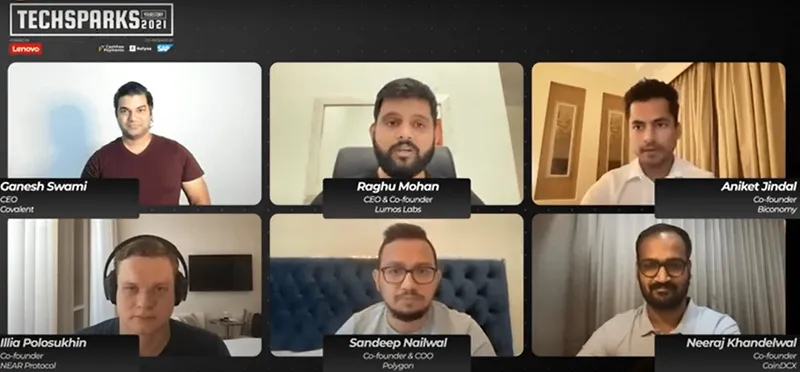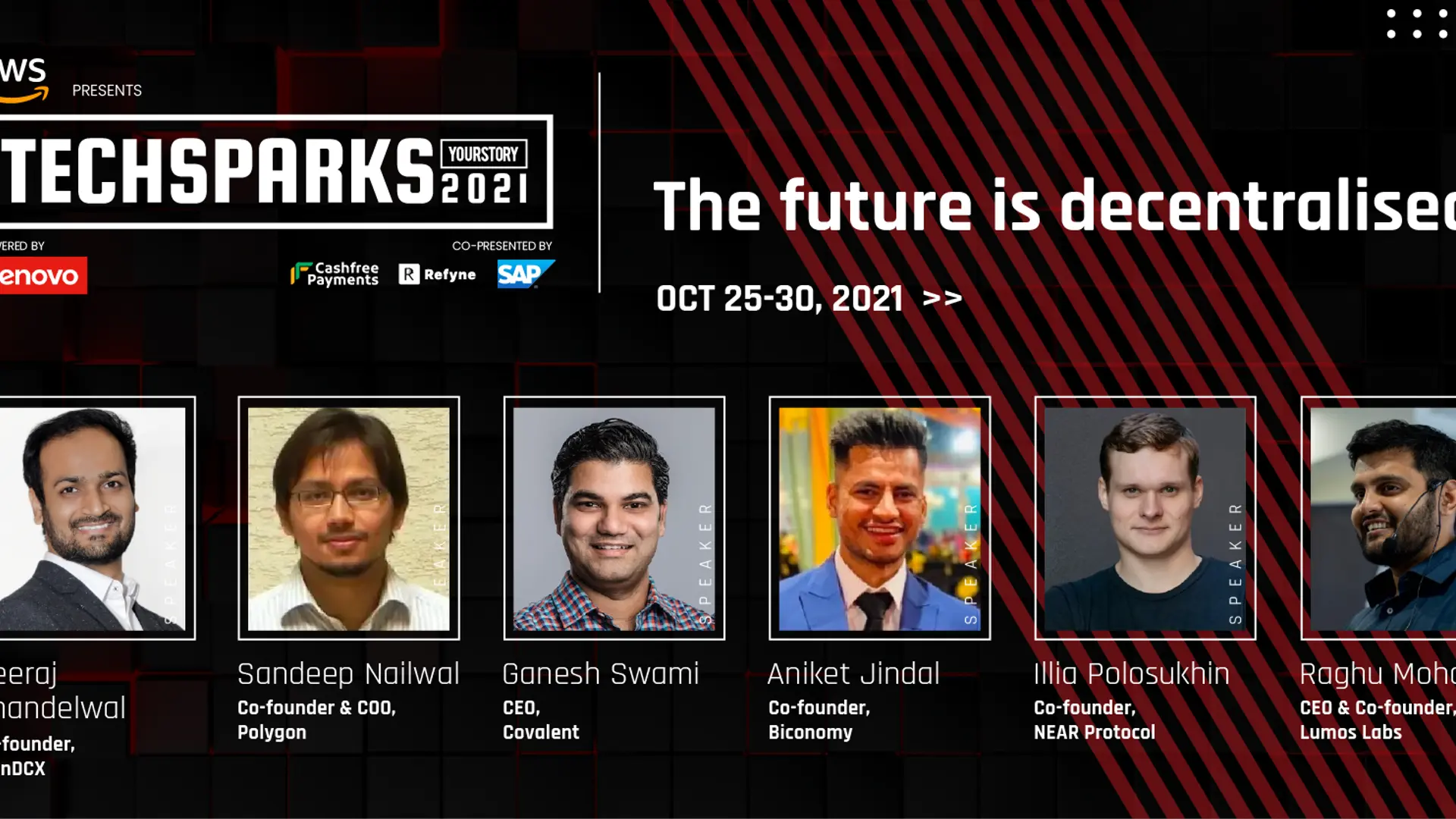Leading blockchain and crypto founders explain why the future is going to be decentralised
Polygon's Sandeep Nailwal, Covalent's Ganesh Swami, Biconomy's Aniket Jindal, NEAR Protocol's Illia Polosukhin, and CoinDCX's Neeraj Khandelwal join Lumos Lab's Raghu Mohan in a discussion on how blockchain is making the case for building a decentralised future.
In the last few years, blockchain technology has emerged as a transformative force in private and public sector operations.
Besides enabling cryptocurrency transactions, blockchain tech can be applied for facilitating cross-border payments and building digital asset marketplaces to supply chain management, etc.
As a distributed ledger technology for executing and recording transactions in a transparent and secure manner, blockchain has been making the case for building a decentralised future.
Diving deep into this topic at YourStory's TechSparks 2021 were Sandeep Nailwal, Co-founder and COO, Polygon; Ganesh Swami, CEO, Covalent; Aniket Jindal, Co-founder, Biconomy; Illia Polosukhin, Co-founder, NEAR Protocol; and Neeraj Khandelwal, Co-founder and CTO, CoinDCX. The panel discussion was hosted by Raghu Mohan, CEO and Co-founder, Lumos Labs.
The panelists explained that for them, decentralisation represents freedom, immutability, self-ownership of identity, a new way of establishing trust and transparency, and a paradigm shift in the way humans organise, create and transfer value.
Ganesh said:"We're in the space not for Bitcoin per se, but for smart contract platforms and enabling new use cases for blockchain technology. It's not about flipping a switch and achieving product-market fit. Demand and acceptance happens slowly at first, and then all at once. Further, the supply side of the tech is ready, and the demand side is becoming more urgent as trust in traditional systems of society is low."
According to Sandeep, post the product-market fit stage, scalability is the next step. Like Polygon, he believes Layer 2 solutions for scaling blockchain is playing a major role in accelerating the adoption of decentralised solutions.
"Now, the total Daily Active Users (DAU) on all chains combined is a few million, and we've seen a lot of Decentralised Apps (DApps) coming in and causing a boom in adoption. With further scalability coming in, the tech and industry will become ready to grow to 15-20 million users, and the tech will eventually develop even further to provide scalability for 100 million users," Sandeep said.
For Neeraj, quantum computing could emerge as a breakthrough technology that enables blockchain's transition to mainstream status.
"Smart contracts are all about global computers, and when most of the logic is shifted to smart contracts, there will be a high requirement for computing power. Here, developments in quantum computing can enhance computing power and the capabilities of blockchain as a technology," he said.

The India scenario
In India, where Neeraj's firm CoinDCX has been playing, the conversation around crypto, NFTs, and DeFi has been steadily rising.
In fact, a report by blockchain data platform Chainalysis ranked India second in terms of global crypto adoption in 2021, amidst global crypto adoption rising over 880 percent in the last year.
So much so that Aniket believes rising acceptance of crypto in society is contributing to further growth.
"In India, the conversation around crypto a few years ago was all about Bitcoin prices and scams. Now, the talk is all about blockchain and how the technology can revolutionise industries. Even our parents are getting used to it, and this shows the mindset is fast changing," he explained.
And with gamification becoming more prevalent across non-gaming sectors, the creation or the journey towards living in a shared, 3D virtual space known as the Metaverse is under way, powered by blockchain.
Illia said, "The Metaverse is not only about playing video games and VR headsets, but also about digitising everything around us. It is about creating a common layer of identity and ownership and bringing what you have with you wherever you go. Crypto is already like Metaverse banking. Going forward, there will be more and more layers moving into a common network of protocols."
To enable such a future, the panelists recognised the importance of regulation, security, compliance and governance. And, regulatory frameworks created by governments are a cornerstone for protecting users, builders and developers in the space.
Neeraj said, "In 1995, if you asked someone about the internet, they had no way to predict how successful companies like Amazon and Google would become. Similarly, in the next 10 years, crypto can create meaningful impact in our lives. For this to happen, regulations need to be defined clearly, and we should start by defining crypto and how it is transacted."
To log in to our virtual events platform and experience TechSparks 2021 with thousands of other startup-tech enthusiasts from around the world, join here. Don't forget to tag #TechSparks2021 when you share your experience, learnings and favourite moments from TechSparks 2021.
For a line-up of all the action-packed sessions at YourStory's flagship startup-tech conference, check out TechSparks 2021 website.

Edited by Teja Lele








